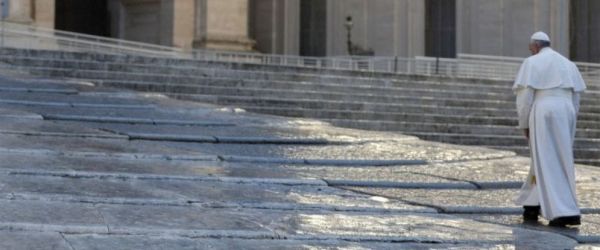At the centre [...] there is the encounter with the Risen One experienced by his disciples, all together. This is evidenced especially by the Gospel which introduces us once again to the Upper Room, where Jesus manifests himself to the Apostles, addressing this greeting to them: “Peace to you” (Lk 24:36). It is the greeting of the Risen Christ, who gives us peace: “Peace to you!”. It is a matter of both inner peace and the peace that is established in interpersonal relationships. The episode recounted by Luke the Evangelist rests heavily on the realism of the Resurrection. Jesus is not a spirit. Indeed, it is not about an apparition of Jesus’ spirit, but of his real presence with his risen body.
Jesus realizes that the Apostles are unsettled in seeing him, that they are bewildered because the reality of the Resurrection is inconceivable to them. They believe they are seeing a spirit; but the Risen Jesus is not a spirit; he is a man with body and soul. This is why, in order to convince them, he says to them: “See my hands and my feet” — he shows them his wounds — “that it is I myself; handle me, and see; for a spirit has not flesh and bones as you see that I have” (v. 39). And since this did not seem enough to overcome the disciples’ disbelief — the Gospel says something interesting: there was so much joy they had within that this joy prevented them from believing it: ‘No, it cannot be! It cannot be so! So much joy is not possible!’. And Jesus, in order to convince them, asks them: “Have you anything here to eat?” (v. 41). They offer him some broiled fish; Jesus takes and eats it in front of them, in order to convince them.
Jesus’ insistence on the reality of his Resurrection illuminates the Christian perspective of the body: the body is not an obstacle nor a prison of the soul. The body is created by God, and mankind is not complete if there is no union of body and soul. Jesus, who has triumphed over death and risen in body and soul, helps us to understand that we must have a positive idea of our body. It can become an occasion or instrument of sin, but sin is not provoked by the body, but rather by our moral weakness. The body is a wondrous gift from God, intended, in union with the soul, to express in fullness the image and likeness of Him. Therefore, we are called to have great respect and care for our body and that of others.
Any offense or wound or violence to the body of our neighbour is an affront to God the Creator! My thoughts go, in particular, to the children, the women, the elderly who are physically abused. In the flesh of these people we find the Body of Christ. Christ wounded, mocked, slandered, humiliated, scourged, crucified.... Jesus taught us love. A love that, in his Resurrection, is demonstrated to be more powerful than sin and death, and seeks to redeem all those who experience in their own body the slavery of our time.
In a world where too often self-importance prevails over the weakest and materialism stifles the spirit, today’s Gospel passage calls us to be people capable of looking deeply, full of wonder and great joy at having encountered the Risen Lord. It calls us to be people who know how to welcome and appreciate the novelty of life that He sows in history, in order to direct it toward new heavens and the new land. May we be sustained in this journey by the Virgin Mary, to whose maternal intercession we entrust ourselves with faith.
[Pope Francis, Regina Coeli 15 April 2018]












